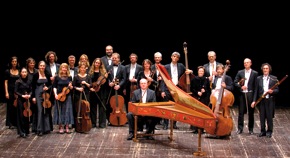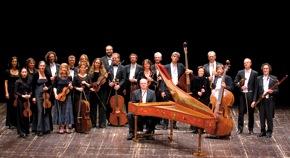Concerto Köln belongs to that rare breed of early-music bands that can make a beloved favorite sound remarkably fresh. Handel fans, for instance, may know them as the orchestra for Harmonia Mundi’s 1991 recording of Giulio Cesare with Jennifer Larmore and Barbara Schlick, still the pacesetter on that front. In their Cal Performances concert (May 1 at First Congregational Church in Berkeley), titled “Bach and the Concerto da Camera in Italy and France,” the audience gets to hear them in Bach’s Fourth and Fifth “Brandenburg” Concertos.

But that’s the sauce for the goose, the culmination of a menu that takes you far beyond Vivaldi in the search for Bach’s concerto models. The other side of Concerto Köln’s personality, the dominant side, is the intrepid adventurer in forgotten, 18th-century repertory. This is where the group originally made its mark, and where it continues to reap awards and critical love letters. One German publication dubbed them “musical truffle pigs,” not the kind of accolade you’d bestow on just anybody.
Throughout Concerto Köln’s 25-year existence, it has made a point of rediscovering composers, any one of whom, you’d think, would be enough to put a stake through the group’s popularity. It recently received two major awards for a recording of symphonies by Henri-Joseph Rigel (even Wikipedia is not much help with this guy). A piece by Antoine Dauvergne makes it into the Cal Performances concert — again, not exactly a household name.
The band thrives by making a real case for these composers, not by dusting off one of their works for a particular concert. Dauvergne was the subject of its 1999 CD release. And often these unusual repertory works benefit not only from intensive research and rehearsal, but also from being at the center of a festival — in this case, the Festtage Alte Musik Köln (Cologne Festival of Early Music), which was inaugurated by Concerto Köln, in association with Deutschlandradio.
The ensemble is unusual in other ways, too. The musicians, originally graduates of European conservatories who started off without taking any direct state funding, remain self-governing. They retain no permanent conductor and usually perform without one (as they will at their Berkeley concert). They rehearse intensively, like many conductorless groups. The startling success of Concerto Köln has made it possible for them to buy their own rehearsal space (in 2005), probably the sole early-music group in Europe to boast that advantage. In their new home, they host seminars, school concerts, and other events, allowing the musicians’ impact on their home city to extend beyond the close-knit early-music community.
So by all means, see and hear Concerto Köln for the Bach and the Vivaldi. But be prepared to enjoy those unexpected byways, as well.

